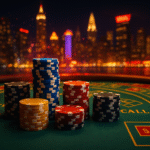
Poker is often seen as a high-stakes game involving strategy, bluffing, and luck. However, it offers much more than just entertainment or the thrill of winning money. Poker can be an incredible tool for personal development, especially when it comes to building confidence and improving social skills. Whether you’re a beginner just learning the rules or an experienced player trying to refine your game, poker provides valuable lessons that can help you become a more confident and socially adept person both at the table and in everyday life. Here’s how:
The Importance of Decision-Making and Confidence
Poker is, at its core, a game of decision-making. Every hand involves a series of choices—should you fold, raise, or call? Should you bluff or play conservatively? These decisions can have significant consequences, and the pressure to make the right choice can be intense. However, the more you play, the better you become at making these decisions, and this is where poker can have a profound impact on your confidence.
In poker, you learn how to assess situations quickly, weigh the risks, and make the best possible move. With each decision you make, you gain confidence in your ability to analyze a situation, even when the odds seem uncertain. The constant practice of evaluating risks and rewards transfers to other areas of life, making you more confident in your decision-making, whether you’re choosing a career path, making financial investments, or deciding how to handle personal relationships.
Handling Losses and Building Emotional Resilience
Anyone who plays poker knows that losing is an inevitable part of the game. Whether it’s due to a bad hand or a well-executed bluff by an opponent, poker can be frustrating, especially when you feel like you’re on a losing streak. However, this is exactly why poker is such a great way to build emotional resilience and confidence.
In poker, learning to handle losses gracefully is just as important as knowing how to win. A key lesson poker teaches is that losing doesn’t mean failure—it’s an opportunity to learn. If you let each loss bring you down, you’ll never succeed in the long run. But if you view each setback as part of the journey and use it to refine your strategy, you’ll grow stronger and more confident over time.
This ability to bounce back after a loss is a life skill that carries over into many other areas. Whether you’re facing setbacks at work or dealing with challenges in your personal life, poker teaches you how to maintain composure, stay focused, and move forward without dwelling on past mistakes.
Mastering Bluffing: The Power of Self-Presentation
One of the most fascinating and widely recognized aspects of poker is the art of bluffing. Bluffing involves pretending to have a stronger hand than you actually do in order to deceive your opponents into making mistakes. It requires you to control your emotions, maintain a “poker face,” and project confidence—even when you’re not entirely sure of your next move.
Bluffing in poker is about creating the illusion of strength and projecting an aura of confidence. The more you practice this skill, the better you become at managing your emotions and presenting yourself assertively, even in uncertain situations. This skill can translate directly into everyday life, especially in situations where you need to persuade, negotiate, or sell yourself, such as job interviews, sales pitches, or social gatherings.
Learning to bluff with confidence teaches you the importance of perception and how others view you. In life, it’s not just about what you have; it’s also about how you present yourself. Poker allows you to practice and refine this important skill, ultimately helping you become more self-assured in various social and professional settings.
Building Communication Skills: Poker as a Social Game
Poker is more than just a solitary game of cards. It’s a social activity that revolves around interacting with other players, reading body language, and sometimes engaging in strategic conversation. Whether you’re in a live poker game or playing online, communication is key to success.
In a live game, poker players are constantly observing their opponents—reading their tells (subtle physical cues or behaviors), gauging their reactions, and attempting to figure out what kind of hand they hold. This requires acute attention to non-verbal communication and the ability to interpret social cues.
Over time, as you play poker with different people, you develop an understanding of how to communicate effectively, not just with words but also with body language. The game encourages you to listen actively, observe others’ behaviors, and express yourself strategically.
These communication skills are invaluable in everyday life, especially in professional settings. Whether you’re negotiating a business deal, making new friends, or even communicating with family members, poker’s emphasis on social interactions helps you become a more effective and confident communicator.
Networking and Expanding Your Social Circle
Another often overlooked benefit of poker is the opportunity it provides for networking and expanding your social circle. Whether you’re playing in a casino, an online poker room, or with friends, poker is a social game that allows you to meet people from all walks of life. The shared experience of playing the game creates a sense of camaraderie and helps to break the ice.
Poker’s social nature also fosters a supportive community where players can exchange strategies, learn from each other, and build lasting friendships. Many poker players attend events, tournaments, and conventions, which can serve as networking opportunities for people looking to connect with others in the industry or simply to meet like-minded individuals.
Being part of the poker community can significantly boost your confidence, especially if you’re naturally introverted or have difficulty initiating conversations. Poker gives you a built-in topic to talk about, and over time, the more you play, the more comfortable you’ll become in group settings. It helps you build relationships, develop new social skills, and expand your network, both personally and professionally.
Confidence Beyond the Poker Table
Poker is more than just a game of cards—it’s a powerful tool for building confidence and improving social skills. The lessons you learn from poker, such as decision-making, emotional resilience, bluffing, communication, patience, and reading people, can make you more confident, socially adept, and emotionally mature.
By embracing poker’s unique combination of strategy, psychology, and social interaction, you can develop skills that transcend the game and help you in every aspect of your life. Whether you’re dealing with tough situations at work, negotiating a business deal, or simply navigating your personal relationships, the confidence and social skills you gain from poker will serve you well.
So, the next time you sit down to play poker, remember that you’re not just refining your poker strategies—you’re also building confidence and developing social skills that will benefit you in countless other ways.




























